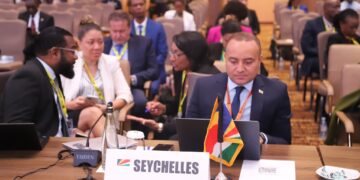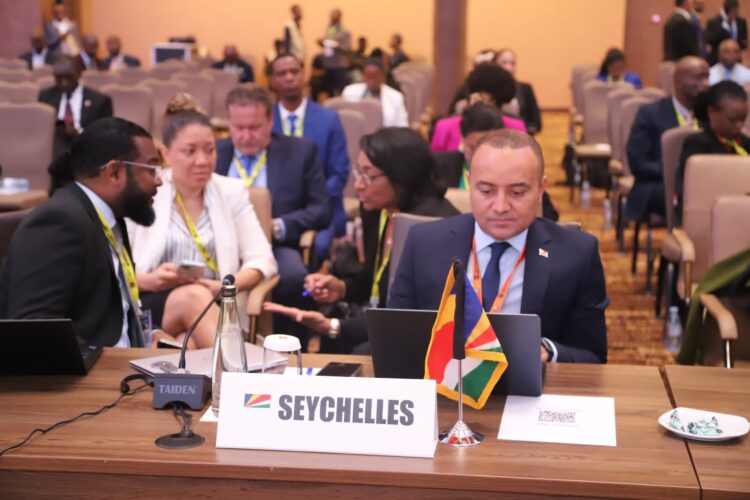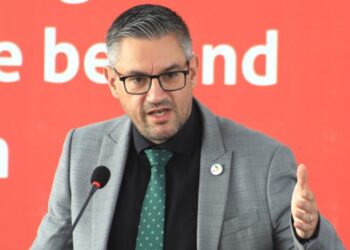By Leonard Kamugisha Akida,
KAMPALA
The Permanent Secretary and Secretary to the Treasury (PSST) Ramtahan Ggoobi has expressed concerns over the increasing financial crimes exacerbated by emerging technologies and cross-border transactions.
PSST Ggoobi was speaking a t a high-profile conference of international leaders and financial experts at the Eastern and Southern Africa Anti-Money Laundering Group (ESAAMLG) at Speke Resort Munyonyo on Wednesday. During the conference, PSST Ggoobi highlighted the misuse of new technologies as the most challenge facing the increasing complexity and scale of illicit financial activities in Africa, calling for unified and strategic approach against financial crimes.
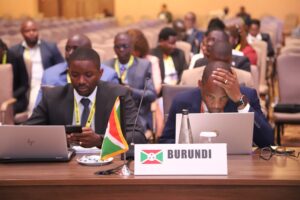
“The challenge we face in combating financial crimes are growing in complexity and scale. The misuse of emerging technologies, the cross-border nature of illicit financial flows and the lingering vulnerabilities within our frameworks for anti-money laundering /combating financing terrorism and proliferation of call for a more unified strategic and adaptive response,” Ggoobi said.
Financial crimes are increasing globally with criminals taking advantage of sophisticated technological advancements such as cryptocurrency and artificial intelligence to launder money and finance illicit activities, making enforcement efforts more challenging.
To counter these threats, the conference called for greater regional corporation, sharing expertise and strengthening compliance with international standards. The conference also discussed about strengthening Anti-Money Laundering (AMI) and Counter-Terrorism Financing measures, as well as the significance of capacity building to detect and combat financial crimes effectively.

Speaking at the conference, the minister of finance planning and economic development in Uganda, Matia Kasaija emphasized Uganda’s commitment to fight money laundering pointing out recent efforts in strengthening the country’s Anti-Money Laundering and Combating Financing of terrorism among other legal and regulatory mechanisms.
“Uganda has taken deliberate steps to enhance its AML/CTF legal and regulatory framework. We amended a number of laws, including the Anti-Money Laundering Act, Cap. 118 and Anti-Terrorism Act, to align them with the Fiancial Action Task Force (FATF) standards,” Kasaija stated.
“Uganda has established functional coordination mechanisms such as National AML/CFT Task Force. The Financial Intelligence Authority (FIA) is a member of the EGMONT Group of Financial Intelligence Unit that facilitates cooperation and intelligence sharing between National Financial Intelligence Units (FIUs) to investigate and prevent money laundering and terrorism financing,” Kasaija added.
In his speech read to him by Rt. Hon. Robinah Nabbanja, the Prime Minister of Uganda, President Museveni said money laundering and financing terrorism is not only a financial crime but also weapons of mass destruction. According to the president, money laundering poses threats to the national security and destabilizes the economy.
“If left unchecked, these illicit activities have the potential to undermine trust in financial systems to move illicit funds across borders, undermining economic growth, fueling corruption and funding terrorism,” Museveni.
Furthermore, the president called for collective actionable strategies and global safer financial systems to to curd down financial crimes.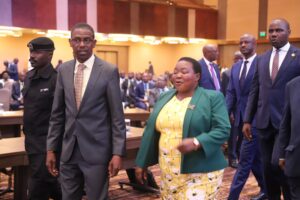
“Uganda remains fully committed to the ESAAMLG Agenda, and will continue to support regional and global initiatives to build a safer and transparent financial systems. Together, we can strengthen the integrity of the global financial system, combat illicit financial flows, and contribute to global economic stability,” Museveni urged.
